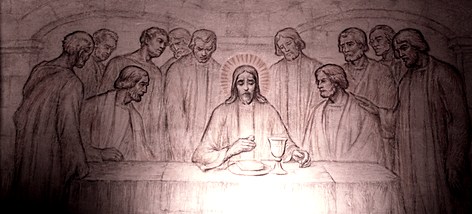Commentaries Index
"Freestyle
Christianity" continued...
The Person of Jesus

 Most
people come to believe in Jesus either through the teachings
and example of others or through reading the Bible.
Since is it possible that a person can come to “know” Jesus
privately by reading the Scriptures it would seem logical
that it is a revelation that can remain private, both as a
personal belief as well as a religious practice. This
would be logical if the Bible only contained an introduction
to Jesus and a list of standards by which a person is to
live by… on a personal level. However, the reality is
that there are many more facets of belief and practice
contained in the Scriptures. Even if taken by
themselves, the four gospels point to an institutional
nature of discipleship and an evangelical nature of fervent
belief in the Son of God. The life of Jesus can be
summarized in the following ways:
Most
people come to believe in Jesus either through the teachings
and example of others or through reading the Bible.
Since is it possible that a person can come to “know” Jesus
privately by reading the Scriptures it would seem logical
that it is a revelation that can remain private, both as a
personal belief as well as a religious practice. This
would be logical if the Bible only contained an introduction
to Jesus and a list of standards by which a person is to
live by… on a personal level. However, the reality is
that there are many more facets of belief and practice
contained in the Scriptures. Even if taken by
themselves, the four gospels point to an institutional
nature of discipleship and an evangelical nature of fervent
belief in the Son of God. The life of Jesus can be
summarized in the following ways:
- Jesus is the Son of God (Mark 1:1)
- He is Lord – Coequal to the Father
(John 1:1-5)
- He lived among us, died and rose
from the dead so that we can be redeemed (Matthew,
20:18-19; John 3:16)
- He taught us how to live a life
pleasing to God (e.g. Matthew 5; Luke 10:12)
- He appointed apostles to proclaim
the Gospel through preaching and teaching as well as
through rituals such as baptism, Lord’s Supper, etc.
(Matthew 28:18-20; Luke 22:19)
- He commanded the disciples to love
and support one another (John 15:12)
- He
will come again as Judge of the world (Matthew
25:31-46)
 The fifth
and sixth points make it practically impossible for there
not to be an institution that naturally springs out of the
reality of Jesus’ life, death and resurrection. It is
very clear that Jesus’ intent was that there be a
recognizable formation of a body of believers that proclaim
His death and resurrection until He comes again. The
gospels’ affirmation of the necessity of the Church are not
the only place in the Bible where the concept of
institutionalized religion is asserted.
The fifth
and sixth points make it practically impossible for there
not to be an institution that naturally springs out of the
reality of Jesus’ life, death and resurrection. It is
very clear that Jesus’ intent was that there be a
recognizable formation of a body of believers that proclaim
His death and resurrection until He comes again. The
gospels’ affirmation of the necessity of the Church are not
the only place in the Bible where the concept of
institutionalized religion is asserted.

 Most
people come to believe in Jesus either through the teachings
and example of others or through reading the Bible.
Since is it possible that a person can come to “know” Jesus
privately by reading the Scriptures it would seem logical
that it is a revelation that can remain private, both as a
personal belief as well as a religious practice. This
would be logical if the Bible only contained an introduction
to Jesus and a list of standards by which a person is to
live by… on a personal level. However, the reality is
that there are many more facets of belief and practice
contained in the Scriptures. Even if taken by
themselves, the four gospels point to an institutional
nature of discipleship and an evangelical nature of fervent
belief in the Son of God. The life of Jesus can be
summarized in the following ways:
Most
people come to believe in Jesus either through the teachings
and example of others or through reading the Bible.
Since is it possible that a person can come to “know” Jesus
privately by reading the Scriptures it would seem logical
that it is a revelation that can remain private, both as a
personal belief as well as a religious practice. This
would be logical if the Bible only contained an introduction
to Jesus and a list of standards by which a person is to
live by… on a personal level. However, the reality is
that there are many more facets of belief and practice
contained in the Scriptures. Even if taken by
themselves, the four gospels point to an institutional
nature of discipleship and an evangelical nature of fervent
belief in the Son of God. The life of Jesus can be
summarized in the following ways:  The fifth
and sixth points make it practically impossible for there
not to be an institution that naturally springs out of the
reality of Jesus’ life, death and resurrection. It is
very clear that Jesus’ intent was that there be a
recognizable formation of a body of believers that proclaim
His death and resurrection until He comes again. The
gospels’ affirmation of the necessity of the Church are not
the only place in the Bible where the concept of
institutionalized religion is asserted.
The fifth
and sixth points make it practically impossible for there
not to be an institution that naturally springs out of the
reality of Jesus’ life, death and resurrection. It is
very clear that Jesus’ intent was that there be a
recognizable formation of a body of believers that proclaim
His death and resurrection until He comes again. The
gospels’ affirmation of the necessity of the Church are not
the only place in the Bible where the concept of
institutionalized religion is asserted.